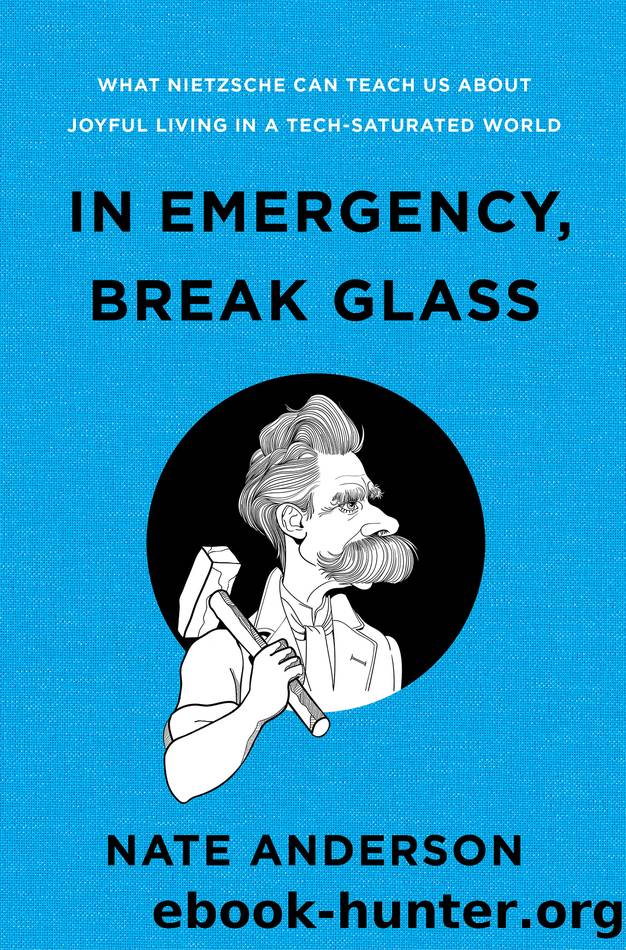In Emergency, Break Glass: What Nietzsche Can Teach Us About Joyful Living in a Tech-Saturated World by Nate Anderson

Author:Nate Anderson [Anderson, Nate]
Language: eng
Format: epub
Tags: Mind & Body, Personal Growth, Philosophy, Success, Individual Philosophers, Epub3, Self-Help, Ethics & Moral Philosophy
ISBN: 9781324004806
Google: xwBLEAAAQBAJ
Publisher: Norton
Published: 2022-05-10T20:42:07+00:00
Info Dump
Unleash the jokesâitâs time to move our metaphor down the alimentary canal. We have discussed what information we consume and how we consume it, but Nietzscheâs unique take may be most apparent in his praise of information evacuation. That isâforgetting.
âForgetting is essential to action of any kind, just as not only light but darkness too is essential for the life of everything organic,â he writes in an early essay. âIt is possible to live almost without memory, and to live happily moreover, as the animal demonstrates; but it is altogether impossible to live at all without forgetting.â
Our brains are notoriously selective. They latch onto the new and they remember the extraordinary, but unchanging stimuli are quickly filtered and forgotten. This can be frustrating, but discarding information seems necessary in order to focus our attention and to take action. Indiscriminate processing and retention of all incoming stimuli would truly turn information into garbage; we would be swamped.
This is essentially the plot of the Jorge Luis Borges short story âFunes, His Memoryâ from the 1944 collection Artifices. In the piece, the narrator encounters one Ireneo Funes, a young man from a poor part of Argentina. His âgiftâ is a perfect memory, but this turns out to be a paralyzing curse. The narrator explains why:
With one quick look, you and I perceive three wineglasses on a table; Funes perceived every grape that had been pressed into the wine and all the stalks and tendrils of its vineyard. He knew the forms of the clouds in the southern sky on the morning of April 30, 1882, and he could compare them in his memory with the veins in the marbled binding of a book he had seen only once, or with the feathers of spray lifted by an oar on the RÃo Negro on the eve of the Battle of Quebracho. Nor were those memories simpleâevery visual image was linked to muscular sensations, thermal sensations, and so on. He was able to reconstruct every dream, every daydream he had ever had. Two or three times he had reconstructed an entire day; he had never erred or faltered, but each reconstruction had itself taken an entire day.
Download
This site does not store any files on its server. We only index and link to content provided by other sites. Please contact the content providers to delete copyright contents if any and email us, we'll remove relevant links or contents immediately.
The remains of the day by Kazuo Ishiguro(8977)
Tools of Titans by Timothy Ferriss(8369)
Giovanni's Room by James Baldwin(7330)
The Black Swan by Nassim Nicholas Taleb(7109)
Inner Engineering: A Yogi's Guide to Joy by Sadhguru(6785)
The Way of Zen by Alan W. Watts(6601)
Asking the Right Questions: A Guide to Critical Thinking by M. Neil Browne & Stuart M. Keeley(5760)
The Power of Now: A Guide to Spiritual Enlightenment by Eckhart Tolle(5758)
The Six Wives Of Henry VIII (WOMEN IN HISTORY) by Fraser Antonia(5501)
Astrophysics for People in a Hurry by Neil DeGrasse Tyson(5182)
Housekeeping by Marilynne Robinson(4436)
12 Rules for Life by Jordan B. Peterson(4299)
Double Down (Diary of a Wimpy Kid Book 11) by Jeff Kinney(4261)
Ikigai by Héctor García & Francesc Miralles(4247)
The Ethical Slut by Janet W. Hardy(4242)
Skin in the Game by Nassim Nicholas Taleb(4239)
The Art of Happiness by The Dalai Lama(4125)
Skin in the Game: Hidden Asymmetries in Daily Life by Nassim Nicholas Taleb(3992)
Walking by Henry David Thoreau(3953)
